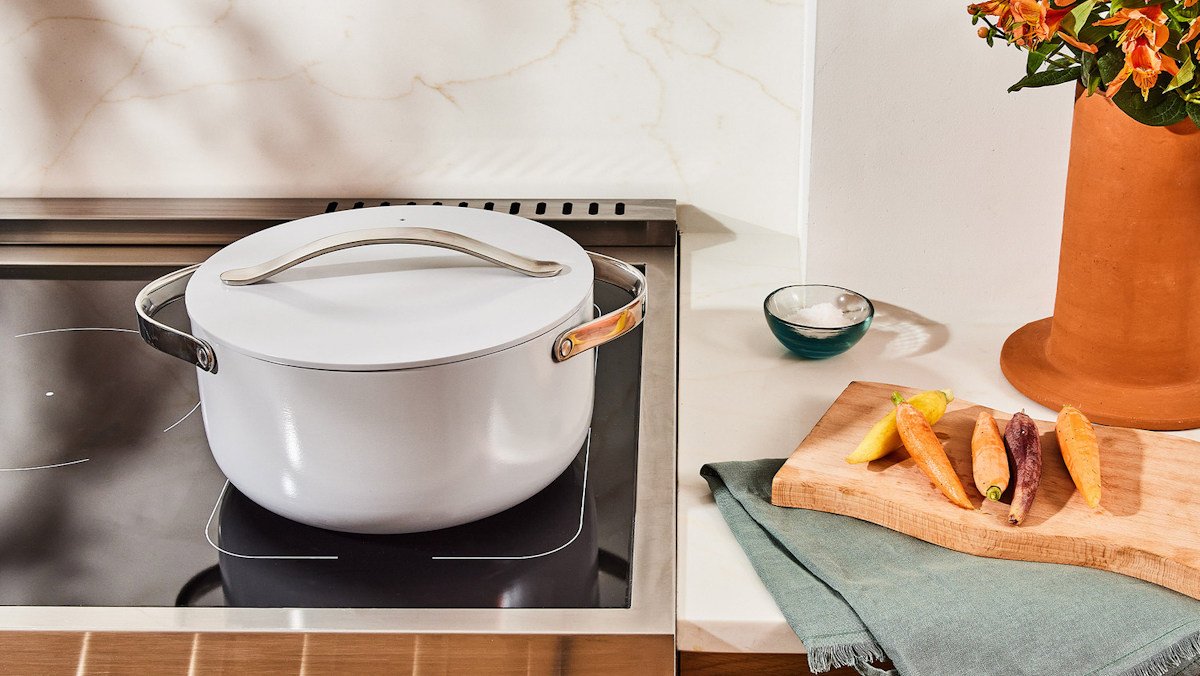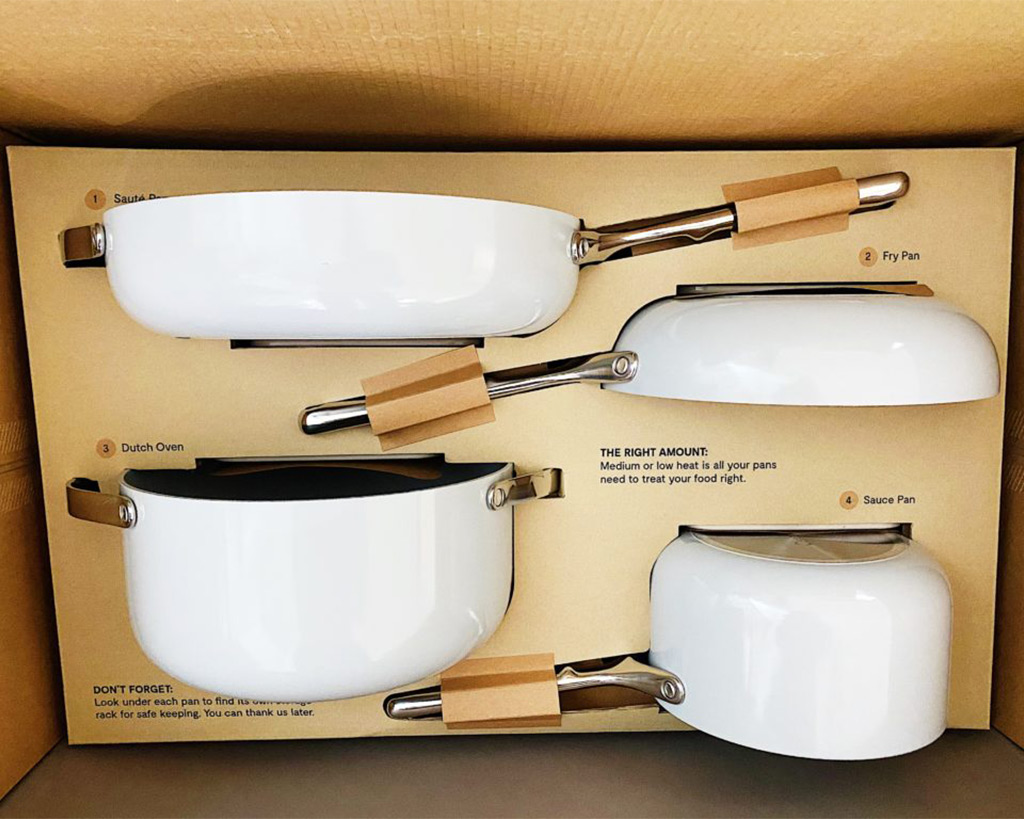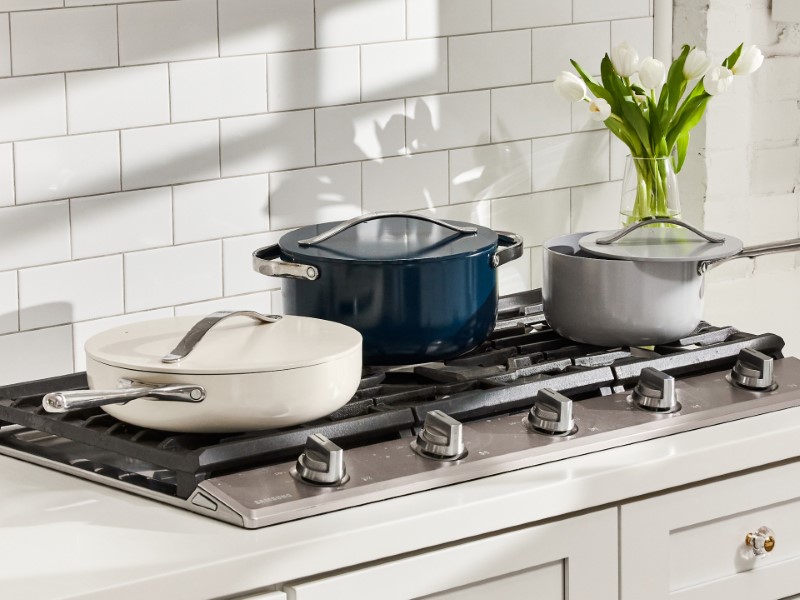You have no items in your cart
Shop our collectionsFree Shipping On Orders $90+
Free Returns
30-Day Trial
Home & Kitchen with Caraway

At Caraway, we understand the magic of a Dutch Oven and are here to guide you through maximizing its potential, ensuring it becomes a key player in making meals that bring everyone to the table.
The Dutch Oven, known for its versatility and durability in modern kitchens, has a humble origin dating back to early American settlers. Initially valued for its practicality, the Dutch Oven underwent refinements by Dutch settlers in Pennsylvania, who further enhanced its functionality, leading to the iconic pot we use today.
Despite its name, the term "Dutch Oven" doesn't reflect its birthplace but is a nod to the Dutch influence on its design. The craftsmanship and innovations brought by the Dutch settlers in perfecting this kitchen essential led to its widespread usage and the familiar name we associate with it today.
Simply put, a Dutch Oven is a heavy-duty pot ready for anything . With a design that includes a tight lid and a capacity for holding over six quarts, it's your go-to for everything from boiling pasta to slow-cooking stews.
They're made to work on both the stovetop and in the oven, giving you flexibility in how and what you cook. Whether it's cast iron or ceramic, each Dutch Oven brings its own benefits to the table, making it a staple in kitchens everywhere.
The real question is, what can't you do with a Dutch Oven? Here's why every home cook should consider making room for one in their kitchen:
Versatile Cooking Methods: Whether you're searing meat at high heat, slow-cooking a stew, or even baking bread, the Dutch Oven does it all. Its ability to transition from stovetop to oven seamlessly opens up a world of culinary possibilities.
Even Heat Distribution: Thanks to its thick walls and heavy bottom, a Dutch Oven ensures even heat retention and distribution, eliminating hot spots and ensuring your dishes cook perfectly every time.
Flavor Enhancement: The tight-fitting lid seals in moisture, aromas, and flavors, enriching the overall taste of your dishes. This is especially crucial for slow-cooked meals, where every note of flavor counts.
One-Pot Meals: The generous size and depth make it ideal for preparing large batches of meals, from soups and stews to roasts, minimizing cleanup and simplifying meal prep.
Durability: Designed to last, a high-quality Dutch Oven can withstand years of use, making it a worthwhile investment for any kitchen.
For those who love to cook (or even those who don't), a Dutch Oven simplifies mealtime while expanding what's possible to make. It's not just about the food you create — it's about making cooking straightforward, leaving you more time to enjoy the meals you love.

Slow Cooking: Dutch Ovens shine in slow-cooking recipes that benefit from extended cooking times. Whether it's a hearty chili, a tender pot roast, or a flavorful curry, the pot's heat retention and sealed lid facilitate long, slow simmering for exquisite results.
Braising: Dutch Ovens excel in braising meats, vegetables, and even grains. The combination of slow, moist cooking with the heat-retentive properties of the pot ensures tender and flavorful results.
Stewing: Perfect for creating rich and hearty stews, Dutch Ovens allow for gentle simmering over extended periods, allowing flavors to meld together and ingredients to reach ideal tenderness.
Roasting: Dutch Ovens can be utilized for dry heat roasting of meats, poultry, and vegetables. The pot's ability to hold heat effectively ensures that foods are evenly cooked and beautifully browned.
Baking: From artisan bread to bubbly casseroles, Dutch Ovens provide a controlled environment for baking. The pot's tight-fitting lid traps steam during baking, resulting in golden, crusty bread or tender, moist baked dishes.
Frying: Dutch Ovens are suitable for frying due to their deep design and heat retention capabilities. Whether shallow frying for crispy foods or deep frying larger items, the pot offers ample space and consistent heat distribution.
One-Pot Meals: Dutch Ovens are ideal for preparing elaborate one-pot meals where ingredients are layered and cooked together. From risottos to tagines, these pots simplify the cooking process and enhance the depth of flavors in the dish.
Desserts: Dutch Ovens can be used for creating decadent desserts like cobblers, crisps, and bread pudding. The pot's ability to maintain consistent heat makes it suitable for baking sweet treats to perfection.

When it comes to choosing the right Dutch Oven for your kitchen, the material is everything. It dictates how your food cooks and how you care for the pot itself.
Let's break down the options:
Cast iron is the original heavy-duty cooking champion. Known for its unparalleled heat retention and even cooking, it's the go-to for chefs aiming for that perfect sear or homely stew.
Yes, it might ask for a bit more care with seasoning and hand washing, but for those flavor-packed dishes that taste like tradition, it's worth it.
Here's where things get interesting. Stainless Steel Dutch Ovens bring a modern twist to this classic cookware. They're tough enough to handle higher temperatures without flinching, and their sleek surface means you're less likely to find your meal sticking to the bottom.
Plus, our stainless steel options sidestep the worry of toxic materials like PFOA or PFAs, ensuring your cooking is safe as well as delicious.
Ceramic Dutch Ovens are where convenience meets care. Our ceramic-coated option promises a non-stick cooking experience without the hassle of seasoning.
And because we're all about keeping things safe, you can rest easy knowing there's nothing harmful hidden in the coating. This non-toxic pot makes cooking and cleanup a breeze, perfect for slow-cooked soups or stews.
When considering alternatives to the revered Dutch Oven, the world of culinary tools includes several options to elevate your cooking experience.
Stainless Steel Pots: Renowned for their lightweight build and efficient heat conductivity, stainless steel pots stand out as practical substitutes for Dutch Ovens. Their versatility and ease of maintenance make them ideal companions for a range of cooking tasks, from simmering soups to sautéing vegetables.
Ceramic-Coated Pots: Embracing the fusion of innovation and aesthetics, ceramic-coated cookware offers a modern twist to traditional cooking vessels. With its non-stick properties and easy-to-clean surface, ceramic cookware provides a seamless cooking experience, perfect for those mindful of health-conscious cooking practices.
Instant Pots: Revolutionizing how we cook, Instant Pots offer a multifunctional alternative to traditional Dutch Ovens. With their pressure cooking, slow cooking, and sautéing capabilities, Instant Pots provide convenience and efficiency for preparing a wide range of dishes in a fraction of the time.
Crock Pots: Embracing the art of slow cooking, Crock Pots provide a hands-off approach to meal preparation, allowing flavors to meld together over hours of gentle simmering. Like the classic Dutch Oven, Crock Pots can be left alone to slow-cook stews, grains, and more.
The Dutch Oven has been one the best cookware companions for home cooks for centuries, turning everyday ingredients into memorable meals. By following the simple care steps outlined, you ensure that this invaluable piece of cookware remains ready for whatever recipe you dream up next.
Here at Caraway, we're committed to making sure those moments are as rich and fulfilling as possible, with cookware that meets your every need with style, safety, and simplicity.
Sources:
What Is a Dutch Oven --- and How Do You Use It? | Good Housekeeping?
How to Clean and Season Cast-Iron Cookware | New York Times
Cast iron | Definition, Composition, History, & Facts | Britannica
Free Shipping On Orders $90+
Free Returns
30-Day Trial